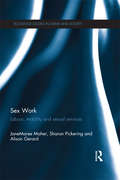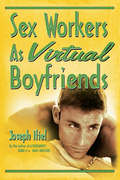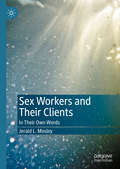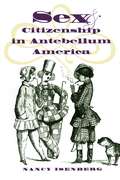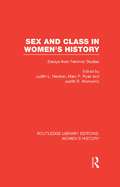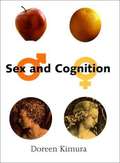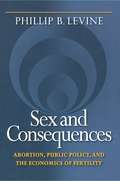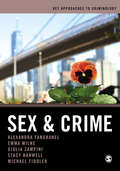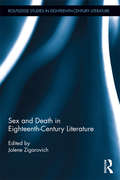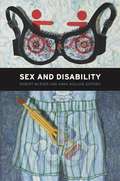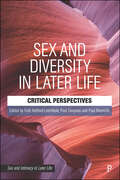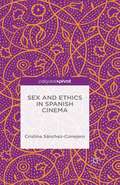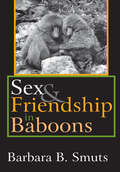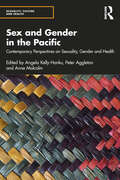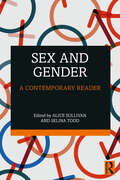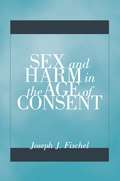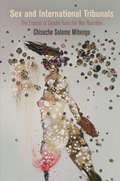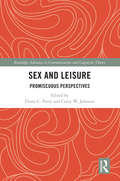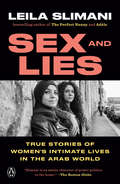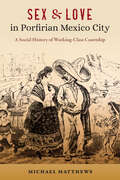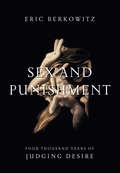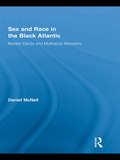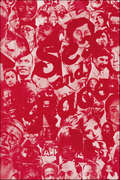- Table View
- List View
Sex Work: Labour, Mobility and Sexual Services (Routledge Studies in Crime and Society)
by Sharon Pickering Alison Gerard JaneMaree MaherSex work has always attracted policy, public and prurient interest. Currently, legal frameworks in developed countries range from prohibition, through partial legalisation to active regulation. Globalisation has increased women’s mobility between developing and developed countries at the same time as women’s employment opportunities in the developed world are shifting. Family and intimate relationships are being transformed by changing demographics, shifting social mores and new intersections between intimate lives and global markets. Sex work is located at the nexus of new intimacies, shifting employment patterns and changing global mobilities. This volume examines the working lives of contemporary sex workers; their practices, their labour market conditions and their engagement with domestic and international regulatory frameworks. It locates the voices and experiences of workers in Melbourne, Australia, at the centre of the sexual services industry as they reflect on brothels and independent escort work, on working conditions and managers, and on the relationships they form with clients. It offers a new account of sex work where women’s labour and mobility is understood as central in local and global imperatives to offer sexual services. It examines how these new imperatives intersect with, challenge and exceed existing regulatory frameworks for sex work. Sex work: labour, mobility and sexual services draws together the everyday practices of sex workers and the broader global markets in which workers negotiate employment. In bringing together these two important intersecting areas, it offers a grounded and innovative account of sex work which will be of interest to academics and policy makers concerned with sex work, gender studies and the sociology of labour.
Sex Workers As Virtual Boyfriends
by Joseph ItielBeyond lust, create companionship with your sex workers!Many more men are willing to buy sex than to admit the fact. Joseph Itiel is not only willing to admit it--he has the courage and style to create “virtual” relationships with hustlers. These ongoing professional relationships are a step beyond cold, anonymous sex for sale. Though the economic basis remains the same--an open exchange of cash for sex--the association is also honest, affectionate, and sexually fulfilling. He explains how you can do the same in Sex Workers as Virtual Boyfriends, a companion volume to his best-selling A Consumer's Guide to Male Hustlers (Haworth 1998).From his own experience, stretching over four decades and many nations, the author suggests ways to transform the relationship between a client and his escort from a crass commercial transaction to a true camaraderie. Sex Workers as Virtual Boyfriends also offers an intimate glimpse into the gay lifestyle in San Francisco and around the world before the AIDS epidemic and in these days of safer sex. Sex Workers as Virtual Boyfriends presents practical tips and real-life vignettes, including: an experiment to help you decide if you could be a sex worker (See if you measure up!) an appendix containing a comprehensive list of sex workers advertising on the World Wide Web seven guidelines for friendly relations with your escort a guide to the etiquette of negotiable affectionSex Workers as Virtual Boyfriends is shocking, sexy, literate, and fun. It also can help you find the affection you want--at a price you can afford.
Sex Workers and Their Clients: In Their Own Words
by Jerald L. MosleyThis book draws on the voices of sex workers and their clients to critically assess the criminalization of prostitution in favour of decriminalization. It does so by contrasting their voices with the claims made by prohibitionists: those advocating the prohibition of prostitution or, at least, the prohibition of the purchase of sexual services, and notes scholarly research that gives context to those accounts and claims. Each chapter is dedicated to a particular issue which is given currency in academic and public debates on sex work. The first part of each chapter reviews the state of research and publicly-aired contentions and the second part compares sex workers' voices with claims from prohibitionists. It highlights the gap between what many sex workers have to say about themselves and what theorizing prohibitionists say about all prostitution. It argues that there is often a striking contrast in attitude, perspective, interpretation and valuation. This books speaks primarily to prohibitionist thinking and sex work stereotyping and, secondarily, to the debate on decriminalization of sex work.
Sex and Citizenship in Antebellum America
by Nancy IsenbergWith this book, Nancy Isenberg illuminates the origins of the women's rights movement. Rather than herald the singular achievements of the 1848 Seneca Falls convention, she examines the confluence of events and ideas--before and after 1848--that, in her view, marked the real birth of feminism. Drawing on a wide range of sources, she demonstrates that women's rights activists of the antebellum era crafted a coherent feminist critique of church, state, and family. In addition, Isenberg shows, they developed a rich theoretical tradition that influenced not only subsequent strains of feminist thought but also ideas about the nature of citizenship and rights more generally. By focusing on rights discourse and political theory, Isenberg moves beyond a narrow focus on suffrage. Democracy was in the process of being redefined in antebellum America by controversies over such volatile topics as fugitive slave laws,temperance, Sabbath laws, capital punishment, prostitution, the Mexican War, married women's property rights, and labor reform--all of which raised significant legal and constitutional questions. These pressing concerns, debated in women's rightsconventions and the popular press, were inseparable from the gendered meaning of nineteenth-century citizenship.
Sex and Class in Women's History: Essays from Feminist Studies (Routledge Library Editions: Women's History)
by Judith L. Newton, Mary P. Ryan and Judith R. WalkowitzThe essays collected in this volume reflect the upsurge of interest in the research and writing of feminist history in the 1970s/80s and illustrate the developments which have taken place – in the types of questions asked, the methodologies employed, and the scope and sophistication of the analytical approaches which have been adopted. Focusing on women in nineteenth-century Britain and America, this book includes work by scholars in both countries and takes its place in a long history of Anglo-American debate. The collection adopts 'the doubled vision of feminist theory', the view that it is the simultaneous operation of relations of class and of sex/gender that perpetuate both patriarchy and capitalism. This view informs a wide variety of contributions from 'Class and Gender in Victorian England', to 'Servants, Sexual Relations and the Risks of Illegitimacy', 'Free Black Women', 'The Power of Women’s Networks', and 'Socialism, Feminism and Sexual Antagonism in the London Tailoring Trade'. Both the vigour and the urgency of scholarship infused with social aims can be clearly felt in the essays collected here.
Sex and Cognition
by Doreen KimuraThe aim of this book is to provide an intelligible overview of the field of sex differences in cognition for the educated non-specialist. The book is not intended as an exhaustive reference work on the subject, though it presents all the major findings.
Sex and Consequences: Abortion, Public Policy, and the Economics of Fertility
by Phillip B. LevineHow do individuals change their behavior when abortion access increases? In this innovative book, economist Phillip Levine uses economic analysis to consider this question, comparing abortion to a form of insurance. Like insurance, he contends, abortion provides protection from downside risk. A pregnant woman who would otherwise give birth to an unwanted child has the option to abort. On the other hand, the availability of this option may increase the likelihood of a pregnancy in the first place. In a very restrictive abortion environment, few women would choose to have an abortion; legalizing abortion would reduce unwanted births. But if abortion becomes readily available, it may cause individuals to increase their sexual activity and/or reduce their use of contraception, Levine contends. Women will become pregnant more frequently, but will abort those pregnancies. Therefore, these abortions will not reduce unwanted births. Levine's analysis suggests that the manner in which individuals change their behavior depends on the extent to which abortion is accessible. He supports these assertions using data from both the United States and Eastern Europe, comparing areas that have restricted access to abortion services with those that have liberalized access. Using sound economic analysis, Sex and Consequences goes beyond the ideological arguments that frequently dominate the abortion debate, lending a new perspective to this controversial subject.
Sex and Crime (Key Approaches to Criminology)
by Emma Milne Alexandra Fanghanel Stacy Banwell Giulia Federica Zampini Michael FiddlerA comprehensive account of the myriad ways that sex and crime interact in contemporary social life, sensitively confronting topics such as nationhood, abortion, child sexual exploitation, war, disability, pornography, and digital cultures. To explain how sex and crime is composed by, and composes, our understanding of these issues, this book: Draws on the authors’ research expertise, insightful case studies, and leading scholarship from across the globe. Develops students’ capacity to engage thoughtfully with diverse problems and to think critically, this is achieved with the help of creative learning exercises, empathetic questioning, and relevant illustrative examples. Encourages readers to be reflexive, open-spirited, and curious about how issues of sex and crime touch their lives and those of people around them.
Sex and Crime (Key Approaches to Criminology)
by Emma Milne Alexandra Fanghanel Stacy Banwell Giulia Federica Zampini Michael FiddlerA comprehensive account of the myriad ways that sex and crime interact in contemporary social life, sensitively confronting topics such as nationhood, abortion, child sexual exploitation, war, disability, pornography, and digital cultures. To explain how sex and crime is composed by, and composes, our understanding of these issues, this book: Draws on the authors’ research expertise, insightful case studies, and leading scholarship from across the globe. Develops students’ capacity to engage thoughtfully with diverse problems and to think critically, this is achieved with the help of creative learning exercises, empathetic questioning, and relevant illustrative examples. Encourages readers to be reflexive, open-spirited, and curious about how issues of sex and crime touch their lives and those of people around them.
Sex and Death in Eighteenth-Century Literature (Routledge Studies in Eighteenth-Century Literature #10)
by Jolene ZigarovichThis book discusses sex and death in the eighteenth-century, an era that among other forms produced the Gothic novel, commencing the prolific examination of the century’s shifting attitudes toward death and uncovering literary moments in which sexuality and death often conjoined. By bringing together various viewpoints and historical relations, the volume contributes to an emerging field of study and provides new perspectives on the ways in which the century approached an increasingly modern sense of sexuality and mortality. It not only provides part of the needed discussion of the relationship between sex, death, history, and eighteenth-century culture, but is a forum in which the ideas of several well-respected critics converge, producing a breadth of knowledge and a diversity of perspectives and methodologies previously unseen. As the contributors demonstrate, eighteenth-century anxieties over mortality, the body, the soul, and the corpse inspired many writers of the time to both implicitly and explicitly embed mortality and sexuality within their works. By depicting the necrophilic tendencies of libertines and rapacious villains, the fetishizing of death and mourning by virtuous heroines, or the fantasy of preserving the body, these authors demonstrate not only the tragic results of sexual play, but the persistent fantasy of necro-erotica. This book shows that within the eighteenth-century culture of profound modern change, underworkings of death and mourning are often eroticized; that sex is often equated with death (as punishment, or loss of the self); and that the sex-death dialectic lies at the discursive center of normative conceptions of gender, desire, and social power.
Sex and Disability
by Robert Mcruer Anna MollowThe title of this collection of essays, Sex and Disability, unites two terms that the popular imagination often regards as incongruous. The major texts in sexuality studies, including queer theory, rarely mention disability, and foundational texts in disability studies do not discuss sex in much detail. What if "sex" and "disability" were understood as intimately related concepts? And what if disabled people were seen as both subjects and objects of a range of erotic desires and practices? These are among the questions that this collection's contributors engage. From multiple perspectives--including literary analysis, ethnography, and autobiography--they consider how sex and disability come together and how disabled people negotiate sex and sexual identities in ableist and heteronormative culture. Queering disability studies, while also expanding the purview of queer and sexuality studies, these essays shake up notions about who and what is sexy and sexualizable, what counts as sex, and what desire is. At the same time, they challenge conceptions of disability in the dominant culture, queer studies, and disability studies.Contributors. Chris Bell, Michael Davidson, Lennard J. Davis, Michel Desjardins, Lezlie Frye, Rachael Groner, Kristen Harmon, Michelle Jarman, Alison Kafer, Riva Lehrer, Nicole Markotić, Robert McRuer, Anna Mollow, Rachel O'Connell, Russell Shuttleworth, David Serlin, Tobin Siebers, Abby L. Wilkerson
Sex and Diversity in Later Life: Critical Perspectives (Sex and Intimacy in Later Life)
by Trish Hafford-Letchfield Paul Simpson and Paul ReynoldsDespite increased awareness of sexual diversity, older people's accounts of sex and intimacy remain marginalised. This edited volume addresses diversity in sexual and intimate experience later in life (50+) and captures international research and analysis relating to intersectional identities. Contributors explore how being older intersects with differences of ethnicity, gender, sexuality and class. Offering a critical focus and original contribution to an emerging, although still relatively neglected field, this collection extends knowledge concerning intimacies, practices and pleasures for those thought to represent normative, non-normative and 'new normative' forms of sexual identification and expression.
Sex and Ethics in Spanish Cinema
by Cristina Sánchez-ConejeroReflecting on a series of ethical and moral questions significant to contemporary Spanish culture, Cristina Sánchez-Conejero analyzes several issues related to sexuality in gender as they're portrayed Spanish film.
Sex and Friendship in Baboons (Evolutionary Foundations Of Human Behavior Ser.)
by Barbara B. SmutsThose who have been privileged to watch baboons long enough to know them as individuals and who have learned to interpret some of their more subtle interactions will attest that the rapid flow of baboon behavior can at times be overwhelming. In fact, some of the most sophisticated and influential observation methods for sampling vertebrate social behavior grew out of baboon studies, invented by scientists who were trying to cope with the intricacies of baboon behavior. Barbara Smuts' eloquent study of baboons reveals a new depth to their behavior and extends the theories needed to account for it.While adhering to the most scrupulous methodological strictures, the author maintains an open research strategy--respecting her subjects by approaching them with the open mind of an ethnographer and immersing herself in the complexities of baboon social life before formulating her research design, allowing her to detect and document a new level of subtlety in their behavior. At the Gilgil site, described in this book, she could stroll and sit within a few feet of her subjects. By maintaining such proximity she was able to watch and listen to intimate exchanges within the troop; she was able, in other words, to shift the baboons well along the continuum from ""subject"" to ""informant."" By doing so she has illuminated new networks of special relationships in baboons. This empirical contribution accompanies theoretical insights that not only help to explain many of the inconsistencies of previous studies but also provide the foundation for a whole new dimension in the study of primate behavior: analysis oft he dynamics of long-term, intimate relationships and their evolutionary significance.At every stage of research human observers have underestimated the baboon. These intelligent, curious, emotional, and long-lived creatures are capable of employing stratagems and forming relationships that are not easily detected by traditional research methods. In the process
Sex and Gender in Acute Care Medicine
by McGregor, Alyson J. and Choo, Esther K. and Becker, Bruce M. Alyson J. Mcgregor Esther K. Choo Bruce M. BeckerUntil the past decade, clinicians and researchers assumed that the medical evaluation and treatment of both women and men were the same. This archaic and dangerous notion persisted in spite of the clear anatomic and physiologic differences between the genders. Today, we fully understand that this paradigm is false. In all specialties of medicine, practitioners and researchers are beginning to consider the influence of sex and gender and how it should inform the care of their patients. This book focuses on the issue of sex and gender in the evaluation and treatment of patients specifically in the delivery of acute medical care. It serves as a guide both to clinicians interested in the impact of sex and gender on their practice and to researchers interested in the current state of the art in the field and critical future research directions.
Sex and Gender in the Pacific: Contemporary Perspectives on Sexuality, Gender and Health (Sexuality, Culture and Health)
by Peter Aggleton Angela Kelly-Hanku Anne MalcolmThis book examines sex, sexuality, gender and health in the Pacific with a focus on three key sets of issues: young people, culture and education; sexual and reproductive health and well-being; and belonging, connectedness and justice. Bringing together the work of scholars from across the Pacific region, this innovative volume showcases traditional knowledge and diverse disciplinary scholarship of policy and practice relevance. In addition to focusing on relationships, health, education, family and community, chapters engage with a number of cross-cutting themes, including violence, justice and rights, and sexuality and gender diversity. Drawing on the diversity and richness of the Pacific, its cultures, languages and people, the book lays the foundations for future conversations and scholarship for, and by, those within the Pacific. Sex and Gender in the Pacific is an important resource for students, researchers and practitioners working in Pacific studies, sexuality and gender studies, public health, nursing, public policy, sociology, education and anthropology.
Sex and Gender: A Contemporary Reader
by Selina Todd Alice SullivanSex and Gender: A Contemporary Reader is a much-needed exploration of the relationship between sex, gender and gender identity. Its multidisciplinary approach provides fascinating perspectives from the sciences, social sciences and humanities, as well as biology, neuroscience, medicine, law, sociology and English literature. The 15 chapters are original contributions, authored by scholars who are leaders in their respective fields. This thought-provoking collection offers significant methodological, theoretical and empirical insights into one of the most fraught debates in contemporary politics and academia. It provides a broad-ranging introduction to the issues central to questions about how and why sex matters from a range of disciplinary perspectives, drawing out the social, political and legal implications. Questions addressed include: Is sex binary? What is a woman? Why do we need data on sex? Also discussed are topics widely debated today such as sports, feminism, sex and inequality, sex-based rights, puberty suppression, criminal justice and gender dysphoria. Sex and Gender: A Contemporary Reader is a timely introduction to contemporary debates on sex and gender. It is an accessible text for both general readers and for students of gender issues across a wide range of disciplines including sociology, education, history, philosophy and gender studies.
Sex and Harm in the Age of Consent
by Joseph J. FischelSex and Harm in the Age of Consent cautions against the adoption of consent as our primary determinant of sexual freedom. For Joseph J. Fischel, consent is not necessarily always ethically sound. It is, he argues, a moralized fiction, and it churns out figures for its normativity: the predatory sex offender and the innocent child.Examining the representation of consent in U.S. law and media culture, Fischel contends that the figures of the sex offender and the child are consent&’s alibi, its negative space, enabling fictions that allow consent to do the work cut out for it under late modern sexual politics. Engaging legal, queer, feminist, and political theory, case law and statutory law, and media representations, Fischel proposes that we change our adjudicative terms from innocence, consent, and predation to vulnerability, sexual autonomy, and &“peremption,&” which he defines as the uncontrolled disqualification of possibility. Such a shift in theory, law, and life would be less damaging for young people, more responsive to sexual violence, and better for sex.
Sex and International Tribunals: The Erasure of Gender from the War Narrative (Pennsylvania Studies in Human Rights)
by Chiseche Salome MibengeBefore the twenty-first century, there was little legal precedent for the prosecution of sexual violence as a war crime. Now, international tribunals have the potential to help make sense of political violence against both men and women; they have the power to uphold victims' claims and to convict the leaders and choreographers of systematic atrocity. However, by privileging certain accounts of violence over others, tribunals more often confirm outmoded gender norms, consigning women to permanent rape victim status.In Sex and International Tribunals, Chiseche Salome Mibenge identifies the cultural assumptions behind the legal profession's claims to impartiality and universality. Focusing on the postwar tribunals in Rwanda and Sierra Leone, Mibenge mines the transcripts of local and supranational criminal trials and truth and reconciliation commissions in order to identify and closely examine legal definitions of forced marriage, sexual enslavement, and the conscription of children that overlook the gendered experiences of armed conflict beyond the mass rape of women and girls. In many cases, a single rape conviction constitutes sufficient proof that gender-based violence has been mainstreamed into the prosecution of war crimes. Drawing on anthropological research in African conflicts, and feminist theory, Mibenge challenges legal narratives that reinscribe essentialized notions of gender in the conduct and resolution of violent conflict and uncovers the suppressed testimonies of men and women who are unwilling or unable to recite the legal scripts that would elevate them to the status of victimhood recognized by an international and humanitarian audience.At a moment when international intervention in conflicts is increasingly an option, Sex and International Tribunals points the way to a more nuanced and just response from courts.
Sex and Leisure: Promiscuous Perspectives
by Diana C. Parry and Corey W. JohnsonThis book uses the emerging and cutting-edge area of leisure research to highlight the importance of sexuality and sexual activity and its relevance to leisure studies. It brings to the fore some complex issues associated with this topic using a range of substantive, epistemological, theoretical and methodological approaches. Drawing on international scholarship, the book examines sexuality from multiple, and at times, competing directions, exploring the continuum of sex from work through to carnal pleasure, and across specific sexual practices including BDSM, pornography, stripping, and sex work. Drawing on critical, feminist, queer, and post theoretical perspectives, the book charts a new direction for leisure studies and sex research, including diverse understandings of leisure practice, sex positivity, fringe and deviant sex practices. Critically, the book moves beyond merely establishing sex as a leisure pursuit to focusing on the compelling and complex intersections between sexuality and leisure. This is fascinating reading for any student or researcher with an interest in leisure, sexuality, gender, cultural studies or sociology.
Sex and Lies: True Stories of Women's Intimate Lives in the Arab World
by Leila Slimani"As revealing as Lisa Taddeo's bestseller Three Women, but it has a more urgent political mission." --Evening Standard A fearless exposé of the secrets and lies of women's intimate lives, by the bestselling author of The Perfect Nanny and Adèle "All those in positions of authority--politicians, parents, teachers--maintain the same line: 'Do what you like, but do it in private.' " Leila Slimani was in her native Morocco promoting her novel Adèle, about a woman addicted to sex, when she began meeting women who confided the dark secrets of their sexual lives. In Morocco, adultery, abortion, homosexuality, prostitution, and sex outside of marriage are all punishable by law, and women have only two choices: They can be wives or virgins. Sex and Lies combines vivid, often harrowing testimonies with Slimani's passionate and intelligent commentary to make a galvanizing case for a sexual revolution in the Arab world.
Sex and Love in Porfirian Mexico City: A Social History of Working-Class Courtship
by Michael MatthewsExploring the sexual lives of the poor and working class in turn-of-the-century Mexico This social history explores the romantic and sexual lives of the poor and working class in Mexico City during the rule of dictator Porfirio Díaz from 1876 to 1911. By analyzing sexually based crime cases and stories in the penny press, Michael Matthews sheds light on everyday struggles, joys, and desires. Matthews argues that lower-class individuals had more liberated sexual lives than their wealthier counterparts, influenced by the city’s growth and cultural changes. In this book, Matthews examines how Mexico City’s expanding infrastructure, increasing factory work, and new leisure and entertainment activities shaped courtship and sexual practices. He delves into the world of tenement buildings and street life to reconstruct days defined by love and desire, romance and rape, seduction and sex work, and promises kept and broken. Matthews connects the sexual culture of the poor to the changes taking place as the Mexican state modernized and underwent tremendous capitalist growth and development. Sex and Love in Porfirian Mexico City provides insights into how social and economic developments shaped cultural norms surrounding honor, marriage, morality, and parental authority during this period. It will spur new reflections on the possible influence of lower-class culture on modern-day romance and sexual values.
Sex and Punishment: Four Thousand Years of Judging Desire
by Eric BerkowitzThe "raging frenzy" of the sex drive, to use Plato's phrase, has always defied control. However, that's not to say that the Sumerians, Victorians, and every civilization in between and beyond have not tried, wielding their most formidable weapon: the law. At any given point in time, some forms of sex were condoned while others were punished mercilessly. Jump forward or backward a century or two (and often far less than that), and the harmless fun of one time period becomes the gravest crime in another. Judging Desire tells the story of the struggle throughout the millennia to regulate the most powerful engine of human behavior.Writer and lawyer Eric Berkowitz uses flesh-and-blood cases-much flesh and even more blood-to evoke the entire sweep of Western sex law, from the savage impalement of an Ancient Mesopotamian adulteress to the imprisonment of Oscar Wilde in 1895 for "gross indecency." The cast of Judging Desire is as varied as the forms taken by human desire itself: royal mistresses, gay charioteers, medieval transvestites, lonely goat-lovers, prostitutes of all stripes, London rent boys. Each of them had forbidden sex, and each was judged-and justice, as Berkowitz shows, rarely had much to do with it.With the light touch of a natural storyteller, Berkowitz spins these tales and more, going behind closed doors to reveal the essential history of human desire.
Sex and Race in the Black Atlantic: Mulatto Devils and Multiracial Messiahs (Routledge Studies on African and Black Diaspora)
by Daniel McNeilThis is the first book to place the self-fashioning of mixed-race individuals in the context of a Black Atlantic. Drawing on a wide range of sources and a diverse cast of characters – from the diaries, letters, novels and plays of femme fatales in Congo and the United States to the advertisements, dissertations, oral histories and political speeches of Black Power activists in Canada and the United Kingdom – it gives particular attention to the construction of mixed-race femininity and masculinity during the twentieth century. Its broad scope and historical approach provides readers with a timely rejoinder to academics, artists, journalists and politicians who only use the mixed-race label to depict prophets or delinquents as "new" national icons for the twenty-first century.
Sex and Race, Volume 1: Negro-Caucasian Mixing in All Ages and All Lands -- The Old World (Sex and Race)
by J. A. RogersIn the Sex and Race series, first published in the 1940s, historian Joel Augustus Rogers questioned the concept of race, the origins of racial differentiation, and the root of the "color problem." Rogers surmised that a large percentage of ethnic differences are the result of sociological factors and in these volumes he gathered what he called "the bran of history"—the uncollected, unexamined history of black people—in the hope that these neglected parts of history would become part of the mainstream body of Western history. Drawing on a vast amount of research, Rogers was attempting to point out the absurdity of racial divisions. Indeed his belief in one race—humanity—precluded the idea of several different ethnic races. The series marshals the data he had collected as evidence to prove his underlying humanistic thesis: that people were one large family without racial boundaries. Self-trained and self-published, Rogers and his work were immensely popular and influential during his day, even cited by Malcolm X. The books are presented here in their original editions.
